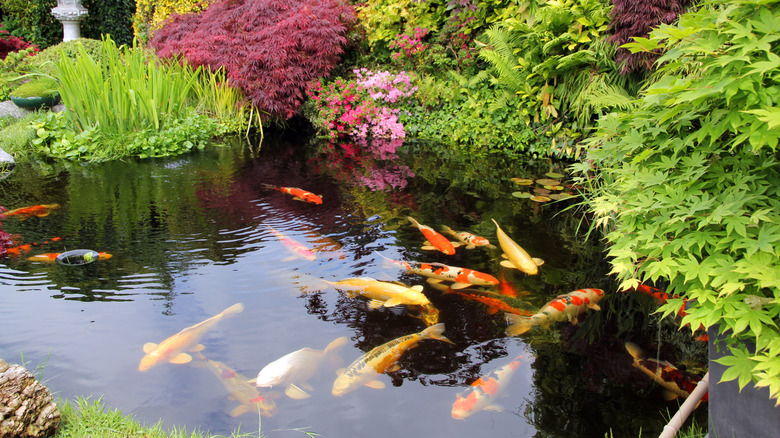Building A DIY Koi Pond In This Container Could Turn Deadly
Koi ponds are one of the most peaceful and relaxing elements of any garden. What gardener wouldn't want a koi pond — especially a relatively inexpensive DIY koi pond — if given the chance? Well, unfortunately, there is more to the picture than what a TikToker showed in their recent video about a DIY koi pond. In the video, @timelessmotifs shows a gorgeous, crystal-clear koi pond in a steel stock tank. It looks absolutely stunning and like any gardener's water feature fantasy. Plus, it appears to be an excellent option for people with limited spaces or budgets who don't have the option to do a professionally installed koi pond.
While this DIY koi pond seems glamorous, the comment section begs to differ. Many people in the comments claimed that galvanized stock tanks are actually extremely toxic to fish. Even worse, one person wrote that they lost $3,000 due to using a steel galvanized stock tank that apparently killed all of their beloved koi fish. Before embarking on any DIY TikTok project, it's imperative to do your own research and ensure that what you are doing is safe and worth your time and effort.
The dangers of galvanized steel
In order to understand why this TikToker's advice can be catastrophic for those trying to create a DIY pond, we need to establish why a galvanized steel stock tank can be fatal for fish. The process of galvanization refers to the application of a protective zinc onto steel. This protects steel from the elements and prevents it from rusting. However, studies show that high levels of zinc contamination in freshwater can be highly toxic to fish, often leading to death. It is unclear what level of zinc is toxic to fish; however, it is clear that chronic exposure can cause death as a result of stress and acute exposure to high levels of zinc destroys the gills of the fish.
Furthermore, it is not recommended to use a galvanized steel stock tank for fish as water is extremely corrosive to metal. While galvanized steel can help prevent moisture damage in small amounts, if it is completely submerged in water, the protective zinc layer (galvanization) quickly corrodes and can leach into the water. Thus, it is not worth the risk to use this kind of galvanized steel stock tank for a container pond because it could contaminate the water and cause you to lose all of your fish. The good news is there are lots of different ways to make an above-ground container pond for your garden.
Alternatives for making a DIY container koi pond
While the idea of slowly poisoning your fish is horrifying, there are much safer options for your DIY koi pond that should not result in the untimely death of beautiful (and expensive) koi fish. If you've already purchased your galvanized steel stock tank, one option is to get a pond liner. However, do note that pond liners can get pretty expensive, and this will most definitely require a good amount of effort on your end as you have to cut and measure the liner to fit the tank and add a sealant to attach it. Another option is to get a plastic stock tank, a whiskey barrel container, or a plastic feed trough from Lowe's or Tractor Supply. While it's not as rustic and farm chic as a galvanized steel tank, at least your fish will be safe. Plus, you can always spice it up by surrounding it with your favorite plants.
If you can put your pond in the ground, you can buy a pond liner, dig out a hole the size of your preference, and then cut the liner accordingly. You can also partially bury the plastic stock tank, giving your small container koi pond a more natural look. Then, you can plant water-loving plants in and around the pond to hide the liner or stock tank and create a lovely, natural-looking water feature in your yard.
